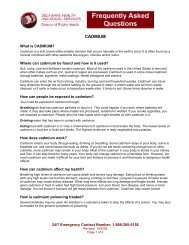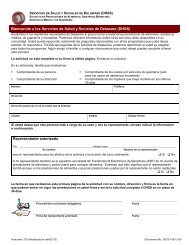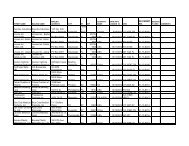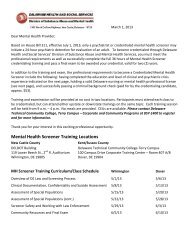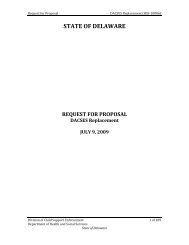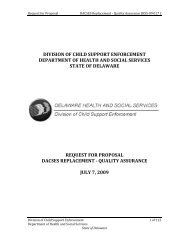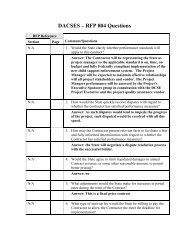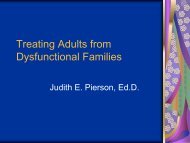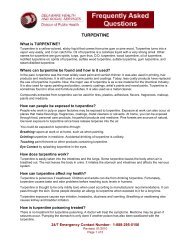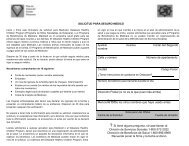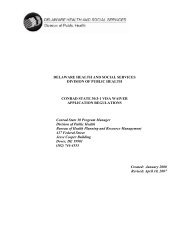D18233 GACHA Annual Report.qxd - Delaware Health and Social ...
D18233 GACHA Annual Report.qxd - Delaware Health and Social ...
D18233 GACHA Annual Report.qxd - Delaware Health and Social ...
You also want an ePaper? Increase the reach of your titles
YUMPU automatically turns print PDFs into web optimized ePapers that Google loves.
<strong>Health</strong> Committee<br />
Chair: Milton Delgado<br />
<strong>Delaware</strong> Hispanics <strong>and</strong> Obesity<br />
<strong>Delaware</strong>’s adult obesity rate is 22.8 percent, ranking it the 29th heaviest in the<br />
nation, according to a new report by The Trust for America's <strong>Health</strong> (TFAH).<br />
The 2006 report, F as in Fat: How Obesity Policies Are Failing in America,<br />
finds that government policy efforts have consistently failed to provide viable<br />
solutions to the growing obesity crisis.<br />
Weight <strong>and</strong> physical activity are closely related factors in health According to<br />
a study conducted by the Rural <strong>Health</strong> Research Center at the University of<br />
South Carolina’s Arnold School of Public <strong>Health</strong>, <strong>Delaware</strong> ranks 8th when<br />
it comes to having the highest proportion of overweight children <strong>and</strong> 6th<br />
with the highest proportion of children who fail to meet physical activity<br />
recommendations.<br />
<strong>GACHA</strong> 2007 <strong>Annual</strong> <strong>Report</strong><br />
Hispanics <strong>and</strong> their children have been particularly affected by the growing prevalence of overweight <strong>and</strong> obesity. In 2005, at least one in<br />
four Hispanic adults living in the U.S. was obese (having a Body Mass Index of 30 or more). More than one in six (16.8%) Hispanic high<br />
school students are overweight. Hispanics’ rates of overweight are significantly higher than whites (11.8%) <strong>and</strong> about the same as blacks<br />
(16.0%) of the same age. An additional 16.7% of Hispanic high school youth are at risk of becoming overweight. This trend continues<br />
among even younger Hispanics.<br />
Childhood obesity in the Hispanic community has reached epidemic proportions. Hispanic children are less active, consume more fat <strong>and</strong><br />
sugar sweetened beverages, <strong>and</strong> eat fewer healthy foods, especially fruits <strong>and</strong> vegetables. The chronic disease conditions directly associated<br />
with poor nutrition <strong>and</strong> inactivity, such as diabetes, health disease, stroke, certain cancers, <strong>and</strong> high blood pressure, are also on the rise. On<br />
average, Hispanic Americans are 1.5 times more likely to have diabetes than non-Hispanic whites of similar age. Mexican-Americans, the<br />
largest Hispanic subgroup, are more than twice as likely to have diabetes as non-Hispanic whites of similar age (Centers for Disease Control<br />
<strong>and</strong> Prevention, 2002).<br />
In an effort to reduce the barriers to Hispanic <strong>Delaware</strong>ans’ access to health information <strong>and</strong> services, the <strong>Delaware</strong> Helpline,<br />
Governor’s Advisory Council on Hispanic Affairs (<strong>GACHA</strong>), <strong>and</strong> Nemours <strong>Health</strong> <strong>and</strong> Prevention Services teamed up to create<br />
ethnically <strong>and</strong> linguistically appropriate Hispanic health resource tools. As a result, they provided a Spanish version of the<br />
<strong>Delaware</strong> Helpline <strong>and</strong> a companion health resource information card, called the <strong>GACHA</strong> Uno Card. Information about<br />
organizations listed with the <strong>Delaware</strong> Helpline that provide assistance in Spanish have been translated <strong>and</strong> made available on<br />
a website, www.<strong>Delaware</strong>Helpline.org, or by calling one of their Spanish speaking information referral specialists at 1-800-464-<br />
HELP. The Uno Card is a h<strong>and</strong>y resource for those without ready access to the Internet. The pocket-sized card lists the<br />
telephone numbers of the most common Spanish-language health <strong>and</strong> social service providers in <strong>Delaware</strong>. A total of 75,000 cards have<br />
been distributed throughout the state in community centers, doctor’s offices, child care facilities, <strong>and</strong> at cultural events.<br />
Based on the fact that <strong>Delaware</strong> Hispanics have limited access to healthy food <strong>and</strong> health-related information, this committee will continue<br />
to advocate for increased access to health-related information, fresh fruits <strong>and</strong> vegetables, <strong>and</strong> safe places to engage in physical activities for<br />
all <strong>Delaware</strong> Hispanics.<br />
14



